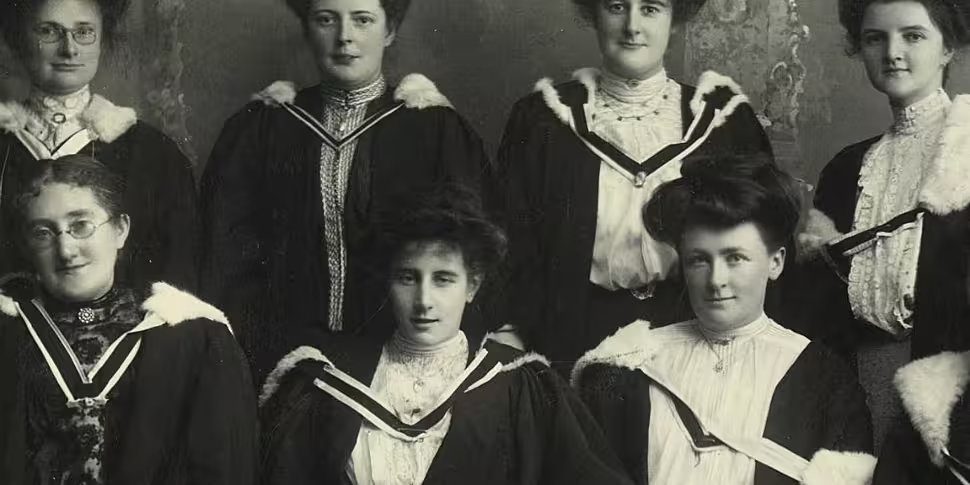In our latest Documentary on Newstalk, Producer Patricia Baker tells the remarkable story of 700 female students from colleges in Oxford and Cambridge who travelled by steamboat to Trinity College Dublin in the early 1900s to collect their degrees…because their own universities refused to confer degrees upon women…IN Steamboat Ladies
Steamboat Ladies is the story of 700 female students from colleges in Oxford and Cambridge who travelled to Trinity College Dublin by Steamboat between 1904 -1907 to collect their degrees. They did this because their own universities refused to confer degrees upon women.
In 1904 Trinity College Dublin opened its doors for the first time to women students. This was a ground breaking move but it had unintended consequences. Between 1904 and 1907, 700 female students from colleges in Oxford and Cambridge travelled to Trinity to receive their degrees, because their own universities refused to confer degrees upon women. They travelled to Ireland by Steamboat. And as such became known as “the Steamboat Ladies”. These were pioneering women from the field of academia, science, and humanities, and they went on to have careers that began to shape the newly emerging role of women in politics and society.
The arrival of the Steamboat Ladies to Trinity was hugely significant. They brought with them an enormous wave of possibilities for women that is still felt today. Steamboat Ladies tells the remarkable story of these pioneering academics and by doing so explores the continuous battle for gender equality within academia.
“I think their story is untold, it is not known” “We were shocked when we heard it, we thought that’s just a story, but it is real” “People who live in our area and go to our type of school, they thought they won’t make it, they won’t be able to go to college, they won’t achieve anything” “Just because we are women and we live around this area doesn't mean we cant achieve what we want to”. “The Steamboat Ladies did not have the opportunities that we have, so why shouldn't we take these opportunities”. “They did not limit themselves so why should we limit ourselves”. “It is normal for us to go to college because of people like them.” ‘The Mercy Girls’, 6th Year students from Mercy Secondary School Inchicore
“Trinity said, ‘we have opened our doors to women now, so for three years we will give degrees to women from Oxford and Cambridge who have successfully completed their degree examinations.’ I think they thought a few Irish girls who were not able to go to Trinity would apply. In the end 700 applied. So they were overwhelmed by all these young women - and not so young - coming over and doing this, and it turned into quite a big episode. It was very good for Trinity women, because they saw these academic women, proudly wearing their gowns and hoods, all professional women, and they said that is what women graduates can do.
“Most of them only came for one night, they would have been lecturers, they were working in school teaching or in public life. They took one day off, they came on the overnight Steamboat, stayed one night in Dublin, got their degrees the next day, and went back the following night. That is why they got nicknamed the Steamboat Ladies. You can imagine an invasion of all these women into Trinity, they came and they went. They were always known, both here and in Oxford and Cambridge as the Steamboat Ladies. Emeritus Fellow Susan Parkes
“When I became a fellow of Trinity in 1968, to mark this occasion, the then Principle of Newnham, Cambridge, Dame Ruth Cowen, gave me one of the Steamboat Ladies gowns, to mark this event. It was a plain black gown. It was a gift from Cambridge to me personally. I thought that was really moving that they wanted to mark the full accession of women to all stages in Trinity, in gratitude for what Trinity had done for them. These were very important women, in society, and in the world of learning, and it was extremely important that they should be recognised as such. Emeritus Professor Barbara Wright
Note: 1968 was the year that Trinity eventually allowed women to become Professors and Barbara Wright was one of the first women to be appointed Professor.
CREDITS: Steamboat Ladies is a Curious Broadcast production It was narrated and produced by Patricia Baker, with edit and final mix by Gerry Horan at Contact Studio. Music by Gerry Horan. The programme was funded by the Broadcasting Authority of Ireland with the Television License Fee.
Steamboat Ladies was broadcast on Newstalk 106 – 108FM Easter Sunday April 21st at 7am and again on Bank Holiday Monday 22nd at 11am
Sound and Vision is a funding scheme for television and radio that provides funding in support of high quality programmes on Irish culture, heritage and experience, and programmes to improve adult literacy. The scheme is managed by the Broadcasting Authority of Ireland.
Curious Broadcast is an arts-based broadcast studio that creates a space for innovation and cultural experimentation across all sectors. Curious Broadcast is based in Inchicore, Dublin 8.











